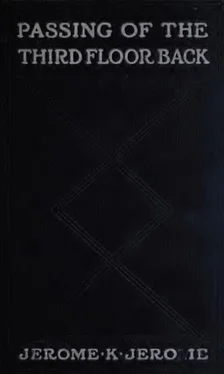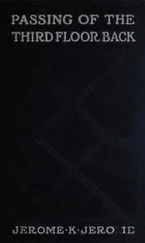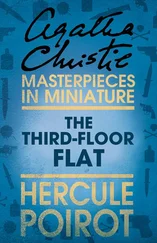“Did I say three pound ten?” demanded Mrs. Pennycherry of the stranger, her hand upon the door. She spoke crossly. She was feeling cross, with the stranger, with herself—particularly with herself.
“You were kind enough to reduce it to that amount,” replied the stranger; “but if upon reflection you find yourself unable—”
“I was making a mistake,” said Mrs. Pennycherry, “it should have been two pound ten.”
“I cannot—I will not accept such sacrifice,” exclaimed the stranger; “the three pound ten I can well afford.”
“Two pound ten are my terms,” snapped Mrs. Pennycherry. “If you are bent on paying more, you can go elsewhere. You'll find plenty to oblige you.”
Her vehemence must have impressed the stranger. “We will not contend further,” he smiled. “I was merely afraid that in the goodness of your heart—”
“Oh, it isn't as good as all that,” growled Mrs. Pennycherry.
“I am not so sure,” returned the stranger. “I am somewhat suspicious of you. But wilful woman must, I suppose, have her way.”
The stranger held out his hand, and to Mrs. Pennycherry, at that moment, it seemed the most natural thing in the world to take it as if it had been the hand of an old friend and to end the interview with a pleasant laugh—though laughing was an exercise not often indulged in by Mrs. Pennycherry.
Mary Jane was standing by the window, her hands folded in front of her, when Mrs. Pennycherry re-entered the kitchen. By standing close to the window one caught a glimpse of the trees in Bloomsbury Square and through their bare branches of the sky beyond.
“There's nothing much to do for the next half hour, till Cook comes back. I'll see to the door if you'd like a run out?” suggested Mrs. Pennycherry.
“It would be nice,” agreed the girl so soon as she had recovered power of speech; “it's just the time of day I like.”
“Don't be longer than the half hour,” added Mrs. Pennycherry.
Forty-eight Bloomsbury Square, assembled after dinner in the drawing-room, discussed the stranger with that freedom and frankness characteristic of Forty-eight Bloomsbury Square, towards the absent.
“Not what I call a smart young man,” was the opinion of Augustus Longcord, who was something in the City.
“Thpeaking for mythelf,” commented his partner Isidore, “hav'n'th any uthe for the thmart young man. Too many of him, ath it ith.”
“Must be pretty smart if he's one too many for you,” laughed his partner.
There was this to be said for the repartee of Forty-eight Bloomsbury Square: it was simple of construction and easy of comprehension.
“Well it made me feel good just looking at him,” declared Miss Kite, the highly coloured. “It was his clothes, I suppose—made me think of Noah and the ark—all that sort of thing.”
“It would be clothes that would make you think—if anything,” drawled the languid Miss Devine. She was a tall, handsome girl, engaged at the moment in futile efforts to recline with elegance and comfort combined upon a horsehair sofa. Miss Kite, by reason of having secured the only easy-chair, was unpopular that evening; so that Miss Devine's remark received from the rest of the company more approbation than perhaps it merited.
“Is that intended to be clever, dear, or only rude?” Miss Kite requested to be informed.
“Both,” claimed Miss Devine.
“Myself? I must confess,” shouted the tall young lady's father, commonly called the Colonel, “I found him a fool.”
“I noticed you seemed to be getting on very well together,” purred his wife, a plump, smiling little lady.
“Possibly we were,” retorted the Colonel. “Fate has accustomed me to the society of fools.”
“Isn't it a pity to start quarrelling immediately after dinner, you two,” suggested their thoughtful daughter from the sofa, “you'll have nothing left to amuse you for the rest of the evening.”
“He didn't strike me as a conversationalist,” said the lady who was cousin to a baronet; “but he did pass the vegetables before he helped himself. A little thing like that shows breeding.”
“Or that he didn't know you and thought maybe you'd leave him half a spoonful,” laughed Augustus the wit.
“What I can't make out about him—” shouted the Colonel.
The stranger entered the room.
The Colonel, securing the evening paper, retired into a corner. The highly coloured Kite, reaching down from the mantelpiece a paper fan, held it coyly before her face. Miss Devine sat upright on the horse-hair sofa, and rearranged her skirts.
“Know anything?” demanded Augustus of the stranger, breaking the somewhat remarkable silence.
The stranger evidently did not understand. It was necessary for Augustus, the witty, to advance further into that odd silence.
“What's going to pull off the Lincoln handicap? Tell me, and I'll go out straight and put my shirt upon it.”
“I think you would act unwisely,” smiled the stranger; “I am not an authority upon the subject.”
“Not! Why they told me you were Captain Spy of the Sporting Life —in disguise.”
It would have been difficult for a joke to fall more flat. Nobody laughed, though why Mr. Augustus Longcord could not understand, and maybe none of his audience could have told him, for at Forty-eight Bloomsbury Square Mr. Augustus Longcord passed as a humorist. The stranger himself appeared unaware that he was being made fun of.
“You have been misinformed,” assured him the stranger.
“I beg your pardon,” said Mr. Augustus Longcord.
“It is nothing,” replied the stranger in his sweet low voice, and passed on.
“Well what about this theatre,” demanded Mr. Longcord of his friend and partner; “do you want to go or don't you?” Mr. Longcord was feeling irritable.
“Goth the ticketh—may ath well,” thought Isidore.
“Damn stupid piece, I'm told.”
“Motht of them thupid, more or leth. Pity to wathte the ticketh,” argued Isidore, and the pair went out.
“Are you staying long in London?” asked Miss Kite, raising her practised eyes towards the stranger.
“Not long,” answered the stranger. “At least I do not know. It depends.”
An unusual quiet had invaded the drawing-room of Forty-eight Bloomsbury Square, generally noisy with strident voices about this hour. The Colonel remained engrossed in his paper. Mrs. Devine sat with her plump white hands folded on her lap, whether asleep or not it was impossible to say. The lady who was cousin to a baronet had shifted her chair beneath the gasolier, her eyes bent on her everlasting crochet work. The languid Miss Devine had crossed to the piano, where she sat fingering softly the tuneless keys, her back to the cold barely-furnished room.
“Sit down!” commanded saucily Miss Kite, indicating with her fan the vacant seat beside her. “Tell me about yourself. You interest me.” Miss Kite adopted a pretty authoritative air towards all youthful-looking members of the opposite sex. It harmonised with the peach complexion and the golden hair, and fitted her about as well.
“I am glad of that,” answered the stranger, taking the chair suggested. “I so wish to interest you.”
“You're a very bold boy.” Miss Kite lowered her fan, for the purpose of glancing archly over the edge of it, and for the first time encountered the eyes of the stranger looking into hers. And then it was that Miss Kite experienced precisely the same curious sensation that an hour or so ago had troubled Mrs. Pennycherry when the stranger had first bowed to her. It seemed to Miss Kite that she was no longer the Miss Kite that, had she risen and looked into it, the fly-blown mirror over the marble mantelpiece would, she knew, have presented to her view; but quite another Miss Kite—a cheerful, bright-eyed lady verging on middle age, yet still good-looking in spite of her faded complexion and somewhat thin brown locks. Miss Kite felt a pang of jealousy shoot through her; this middle-aged Miss Kite seemed, on the whole, a more attractive lady. There was a wholesomeness, a broadmindedness about her that instinctively drew one towards her. Not hampered, as Miss Kite herself was, by the necessity of appearing to be somewhere between eighteen and twenty-two, this other Miss Kite could talk sensibly, even brilliantly: one felt it. A thoroughly “nice” woman this other Miss Kite; the real Miss Kite, though envious, was bound to admit it. Miss Kite wished to goodness she had never seen the woman. The glimpse of her had rendered Miss Kite dissatisfied with herself.
Читать дальше










